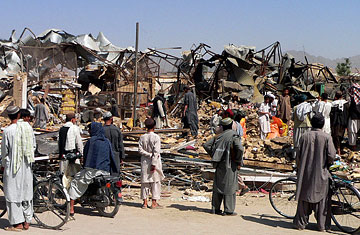
Afghan onlookers at the site of a bomb blast in Kandahar province on Aug. 27
This volatile city in southern Afghanistan, known as the spiritual birthplace of the Taliban, isn't unfamiliar with the staccato rattle of gunfire and the thunder of explosions. But last week's bomb attack — the deadliest in years — has deepened the anguish of war-weary Kandaharis living in the shadow of rising violence. A cluster of vehicle bombs ripped through a central area of Kandahar, killing 43 and injuring 65, nearly all of them civilians. The ear-piercing explosions sent shock waves through the city, smashing windows miles away from the bombing site and leaving broken shards of glass and mangled remains of cars strewn on the streets. Heaps of rubble and smoldering debris lay amid dozens of damaged buildings, now resembling more the ruins of an ancient civilization.
In the days before and after the country's landmark presidential elections on Aug. 20, Afghanistan has seen the highest level of civilian deaths since the Taliban was routed out of power in 2002. As uncertainty surrounds the final outcome of the presidential vote, fraught with low turnout and mounting accusations of election fraud, Afghan civilians are at a greater risk than ever of violent attacks, aid officials warn. "With the outcome of voting in Afghanistan unclear, the danger and insecurity facing millions of Afghans continues and in fact is higher now than ever," says Sam Zarifi, Amnesty International's Asia-Pacific director. "Antigovernment groups, including the Taliban, have demonstrated a systematic contempt for the safety of civilians by targeting Afghans who want to establish their future through ballots, not bullets."
Although the Taliban shrugged off responsibility for last week's bombing, coalition forces squarely lay the blame on them. Wary the high civilian deaths might stoke public outrage, the Taliban is trying to wriggle out of blame, says James Appathurai, NATO's spokesman in Brussels. "I have seen that the Taliban deny responsibility. They do not get to wash their hands of this," he said this week. The Taliban have gained control of vast swathes of Afghanistan's south and east over the past few years, prompting the U.S. to send an additional 21,000 troops to the country this year. With this supplication, there are now a total of 60,000 U.S. troops in the country to combat the resurgent Taliban. General Stanley McChrystal, the top NATO commander in Afghanistan, has raised concerns about the Taliban's menacing encroachment into Kandahar. It is expected that he will inject 3,000 of the 21,000 reinforcements into the city, thereby doubling the number of coalition forces guarding the province.
But despite assurances of an Iraq-style troops surge, Kandaharis feel increasingly vulnerable. All through last week, people trapped beneath piles of debris were dug out by rescue officials. Azam Muhammed, a 25-year-old construction laborer, was rescued six hours after the blast. Just minutes after the muezzin's call to prayer was sounded, he was about to break his Ramadan fast when the explosion struck. Like scores of other victims, he was taken to the city's Mirwais Regional Hospital, where he lay in pain on a bed amid the smell of antiseptic. Gul Muhammed, his brother, who took him there, says Azam is one of the more fortunate victims. "He was pulled out of the debris alive," he says. "When I went looking for him, I found dead bodies and severed limbs scattered around the bombing site."
In recent months, the steep escalation in targeted and random killings has turned Kandahar, the largest city in the south, into a cauldron of violence. A drive through the dusty streets is a chronicle of Afghanistan's never-ending war. Buildings across the city are scarred by shrapnel and pocked with bullet holes. Concrete roads are riddled with gaping holes in the ground where improvised explosive devices (IEDs) have been laid. And blackened divots are visible where suicide bombers — or 'human IEDs,' in colloquial parlance — blew themselves up. The streets of Kandahar, once a thriving business hub, go empty at sundown as shops selling Persian carpets and gold signet rings pull down their shutters. Thin slivers of smoke are seen rising from the roadside iftar stalls selling kebabs, the only visible sign of life after dark. Those, too, fade away after a while.
